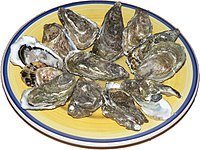
Photo from wikipedia
Flocculation and sedimentation of a protein-rich biomass from shrimp boiling water (SBW) using food grade polysaccharides (carrageenan, alginate and carboxymethyl cellulose (CMC)) as flocculants was investigated at different pH-values. The… Click to show full abstract
Flocculation and sedimentation of a protein-rich biomass from shrimp boiling water (SBW) using food grade polysaccharides (carrageenan, alginate and carboxymethyl cellulose (CMC)) as flocculants was investigated at different pH-values. The effect of flocculant concentration on particle size and viscosity of SBW was also evaluated. Flocculation with carrageenan (0.45 g/L) at pH = 4 exhibited the most efficient protein sedimentation; protein concentration of the upper phase was here reduced by 77%, allowing 86% protein to be sedimented from SBW. Flocculation by alginate and CMC at pH = 4 showed 67% and 60% protein reduction of the upper phase at concentrations of 0.5 and 0.2 g/L, respectively. Contrary to alginate and CMC, carrageenan concentration affected the size distribution of flocs. Finally, carrageenan at 0.45 g/L and pH = 4 was successfully tested in a scaled up trial (5L) providing 78.5% protein recovery and a biomass with 75% protein on dry weight basis.
Journal Title: Food chemistry
Year Published: 2019
Link to full text (if available)
Share on Social Media: Sign Up to like & get
recommendations!